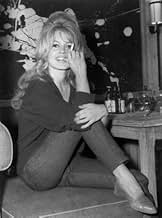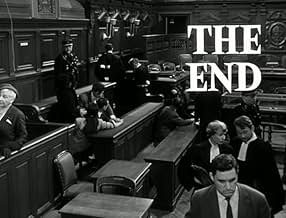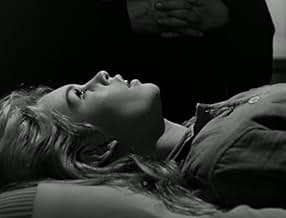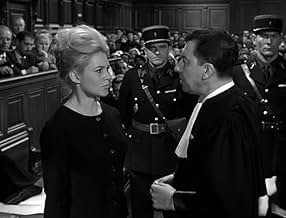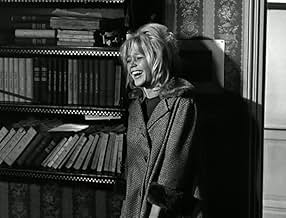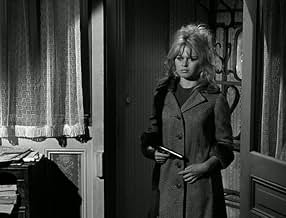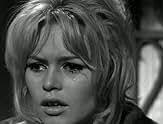VALUTAZIONE IMDb
7,6/10
4961
LA TUA VALUTAZIONE
Segue la giovane ragazza libera e ferita che ha sfidato la Francia ipocrita.Segue la giovane ragazza libera e ferita che ha sfidato la Francia ipocrita.Segue la giovane ragazza libera e ferita che ha sfidato la Francia ipocrita.
- Regia
- Sceneggiatura
- Star
- Candidato a 1 Oscar
- 3 vittorie e 2 candidature totali
Barbara Sommers
- Daisy
- (as Barbara Sohmers)
Recensioni in evidenza
10pzanardo
It appears that the outstanding director Henri-George Clouzot was unable to make movies short of being masterpieces. "La Verite" may be defined as the "European Rashomon", and, well aware that my opinion will be considered a sacrilege, I venture to say that Clouzot's film is even better than Kurosawa's celebrated masterpiece. In fact, the essence of both "Rashomon" and "La Verite" lies in the quest of the truth of a story, reconstructed through a sequence of flash-backs.
"La Verite" narrates the trial of the breathtakingly-beautiful-sexy lost girl Dominique (Brigitte Bardot), for the murder of her former boy-friend Gilbert (Samy Frey). Everybody (Dominique herself, her former friends and various lovers, her enemies, notably her own sister, as well as lawyers and prosecutors) states his own version of the facts, but what is the actual truth? To simplify the question: is Dominique just a ruthless killer, or was she a weak, enamored girl, victim of Gilbert's selfishness and bullying? As always in Clouzot's movies, "La Verite" is extremely intense, packed with a profound and uncompromising psychological study. The almost obsessive pace of events gives no break to both the characters and the audience. The script is first-rate, with plenty of cynical sense of humor, in spite of the dramatic facts told.
Brigitte Bardot was a great actress, endowed with an outstanding talent. A careful viewer could easily get it even from BB's performances in minor movies, like, say "Mademoiselle Pigalle". Here, under the sound direction of a genius like Clouzot, she is just sensational in a highly dramatic role. Of course, also the acting by the remainder of the cast is excellent, especially, needless to say, by the legends Charles Vanel and Paul Meurisse, as the two lawyers.
Possibly, the main credit of this fantastic movie lies in a gelid, sarcastic, misanthropic representation of human society. Arguably, this is the trade-mark of Clouzot's style, together with suspense, which here is present but not exasperated like in his other works. The world of the adults is wholly despicable, permeated as they are with hypocrisy, with prejudice and fear, especially in sexual matters, and with sickening cynicism, as masterly represented by the lawyer Paul Meurisse.
However, the youngsters are no better than the adults. They are just fatuous, selfish, conceited loafers, only able to utter pseudo-intellectual chats. As a matter of fact, when Dominique founds herself in dire straits, none of her young friends moves a finger to help her. And Dominique often appears even worse than the others. From some point of view, she might be considered a totally negative character.
So, what's the point of Clouzot? I think that's not an issue. He just shows what he sees; that's the style and the aim of one of the greatest artists in the history of cinema.
"La Verite" is a total masterpiece. It is impossible to be disappointed. Highly recommended.
"La Verite" narrates the trial of the breathtakingly-beautiful-sexy lost girl Dominique (Brigitte Bardot), for the murder of her former boy-friend Gilbert (Samy Frey). Everybody (Dominique herself, her former friends and various lovers, her enemies, notably her own sister, as well as lawyers and prosecutors) states his own version of the facts, but what is the actual truth? To simplify the question: is Dominique just a ruthless killer, or was she a weak, enamored girl, victim of Gilbert's selfishness and bullying? As always in Clouzot's movies, "La Verite" is extremely intense, packed with a profound and uncompromising psychological study. The almost obsessive pace of events gives no break to both the characters and the audience. The script is first-rate, with plenty of cynical sense of humor, in spite of the dramatic facts told.
Brigitte Bardot was a great actress, endowed with an outstanding talent. A careful viewer could easily get it even from BB's performances in minor movies, like, say "Mademoiselle Pigalle". Here, under the sound direction of a genius like Clouzot, she is just sensational in a highly dramatic role. Of course, also the acting by the remainder of the cast is excellent, especially, needless to say, by the legends Charles Vanel and Paul Meurisse, as the two lawyers.
Possibly, the main credit of this fantastic movie lies in a gelid, sarcastic, misanthropic representation of human society. Arguably, this is the trade-mark of Clouzot's style, together with suspense, which here is present but not exasperated like in his other works. The world of the adults is wholly despicable, permeated as they are with hypocrisy, with prejudice and fear, especially in sexual matters, and with sickening cynicism, as masterly represented by the lawyer Paul Meurisse.
However, the youngsters are no better than the adults. They are just fatuous, selfish, conceited loafers, only able to utter pseudo-intellectual chats. As a matter of fact, when Dominique founds herself in dire straits, none of her young friends moves a finger to help her. And Dominique often appears even worse than the others. From some point of view, she might be considered a totally negative character.
So, what's the point of Clouzot? I think that's not an issue. He just shows what he sees; that's the style and the aim of one of the greatest artists in the history of cinema.
"La Verite" is a total masterpiece. It is impossible to be disappointed. Highly recommended.
By far the best Brigitte Bardot picture, engaged with the avant-garde director Henry-Georges Clouzot, fitting perfect with a drawn up screenplay, about a lazy girl Dominique (Bardot) tired of his hometown lifestyle, decides by any mean living together with her old sister Annie (Marie-Jose Nat) at glamorous Paris in the early sixties, meanwhile his sister makes a hard efforts to learning classic music, otherwise Dominique dropped her preparatory course to work at beauty parlor, spending her time at bars and night clubs with questionable friendship, until meets Gilbert Tellier (Sami Frey) a promising musician which his sister raising hopes for future marriage, Tellier gonna crazy by so beautiful and sexy Dominique, although she scorns him, when he finally got her, he treats her possessively and grossly, they break apart, she suffers and end up sell yourself on prostitution, at their last meeting she on its kenees begs your pardon, then they had a love night and Dominique is merciless waived on the morning by his cold lover, abased deeply for such ruthlessness, later she kills him and tried out committed suicide afterwards saves in time, brought to trial, she is judge in her dingy background lifestyle, there lawers's battle begin although an unexpected ending, mastery Clouzot explores all strong sexy appeal that BB can delivers with dared scenes, told by countless and overlong flashbacks, my favorite Bardot picture!!
Resume:
First watch: 2020 / How many: 1 / Source: DVD / Rating: 8.75
Resume:
First watch: 2020 / How many: 1 / Source: DVD / Rating: 8.75
If "Rashomon" blew your mind, "La vérité" will blow your heart. In 1950, Japanese director Akira Kurosawa blew our minds with his unforgettable "Rashomon", a murder mystery that exposed the chimerical nature of truth as it is perverted by the flawed perception of each observer. We visualized the events surrounding a murder, via the conflicting testimonies of witnesses in court, never being told what's truth and what is not. Here in 1960 French director Henri-Georges Clouzot hits us with "La vérité", a murder mystery similarly visualized via testimonies in a courtroom drama, but in this case the facts are not disputed. In this case what's being subjectively perverted is the emotion behind the crime.
Brigitte Bardot is a young girl on trial for the murder of her lover. The prosecution perceives her as a cold-hearted, calculating killer. The defense sees her as a heartbroken, confused young girl pushed to a desperate act. What we get is a suspenseful peeling of the truth, but not the truth in terms of facts. We get to the root of the truth in terms of feelings. I imagine if you were to hook electrodes to your brain and study which areas light up when watching these films, "Rashomon" would light up your frontal lobe (logic center) while "La vérité" would light up that tiny peanut at the core of your head, the amygdala (emotional center).
The point being made, and unforgettably expressed in a passionate monologue by Ms. Bardot, is that hard facts aren't the only component of truth. She roars: "You sit up there, in your ridiculous robes, and you want to judge but you have never lived! Never loved! You hate me because you are dead! Dead!"
I challenge anyone to watch that scene and tell me that Brigitte Bardot isn't one of the finest actors. Even at the young age of 25, thrust into an intimidating arena alongside theatrically trained, veterand actors and one of the most notoriously perfectionist directors of cinema, she really carries the show. The role had originally been written for respected actor Sophia Loren, but Clouzot rewrote the entire story for Bardot after she was cast. Indeed she seemed to be made for this role and vice versa; the role was written for her (literally). In interviews Bardot stated that with no formal acting training she had to rely on convincing herself that she actually was the character Dominique. And this itself leads to a bizarre case of life imitating art (or the other way around?) where, feeling judged and persecuted by the press, Brigitte had a severe breakdown and shocking incident on her birthday in 1960 just weeks before the film's release. Google it after you watch the movie. Funny how even the press's & haters' reaction to the incident mirrored the prosecution's reaction to similar incidents in the tale of Dominique.
This film is a landmark with regard to emotional storytelling. And it's a landmark with regard to our human experience, attempting to understand this misshapen thing called reality. If you learned something from "Rashomon" then don't consider your education complete until you watch this essential companion film.
Brigitte Bardot is a young girl on trial for the murder of her lover. The prosecution perceives her as a cold-hearted, calculating killer. The defense sees her as a heartbroken, confused young girl pushed to a desperate act. What we get is a suspenseful peeling of the truth, but not the truth in terms of facts. We get to the root of the truth in terms of feelings. I imagine if you were to hook electrodes to your brain and study which areas light up when watching these films, "Rashomon" would light up your frontal lobe (logic center) while "La vérité" would light up that tiny peanut at the core of your head, the amygdala (emotional center).
The point being made, and unforgettably expressed in a passionate monologue by Ms. Bardot, is that hard facts aren't the only component of truth. She roars: "You sit up there, in your ridiculous robes, and you want to judge but you have never lived! Never loved! You hate me because you are dead! Dead!"
I challenge anyone to watch that scene and tell me that Brigitte Bardot isn't one of the finest actors. Even at the young age of 25, thrust into an intimidating arena alongside theatrically trained, veterand actors and one of the most notoriously perfectionist directors of cinema, she really carries the show. The role had originally been written for respected actor Sophia Loren, but Clouzot rewrote the entire story for Bardot after she was cast. Indeed she seemed to be made for this role and vice versa; the role was written for her (literally). In interviews Bardot stated that with no formal acting training she had to rely on convincing herself that she actually was the character Dominique. And this itself leads to a bizarre case of life imitating art (or the other way around?) where, feeling judged and persecuted by the press, Brigitte had a severe breakdown and shocking incident on her birthday in 1960 just weeks before the film's release. Google it after you watch the movie. Funny how even the press's & haters' reaction to the incident mirrored the prosecution's reaction to similar incidents in the tale of Dominique.
This film is a landmark with regard to emotional storytelling. And it's a landmark with regard to our human experience, attempting to understand this misshapen thing called reality. If you learned something from "Rashomon" then don't consider your education complete until you watch this essential companion film.
Here Brigitte Bardot strips bare and the precedent writer was completely right;it's not Dominique who's judged ,but Bardot herself.Never a character had been closer to the actress -I'm obviously speaking of the public figure- than this victim.Because she's primarily a victim : of a family who was dreaming of a good girl,respectful of family values -see Marie -José Nat 's Annie ,the perfect sister ,the "good" ,the earnest musician :she's so "straight"so "holier-than-thou,that she's almost frightening-;of a society ,not prepared to accept this new way of life,which predates the events of MAY 1968 and woman's lib;and finally,and mainly ,of men:they,too, are not prepared to accept the fact that a woman wants to live like .. a man:Samy Frey,the well-respected and well-meaning young man is actually a macho as well as a future mean bourgeois.
The man who worked this miracle ( turning Bardot into a first -class thespian) is none other than Henri-Georges Clouzot,one of the most daring clever gifted directors France has ever known.It was probably a hard time for him:he was about to become ill ,and that would prevent him from making another movie before 1968 ("the prisoner" ,his final achievement);besides the nouvelle vague on the rise dismissed Clouzot as a man of of the past,one of those creeps who "did not live what he was filming" (sic).Clouzot ,at his best, was better than 10 Chabrol ,20 Truffaut and 100 Godard ,but there's no accounting for tastes.Suffice to say that Clouzot,during his relatively short career (20 years ,and 11 films) ,took more chances single-handedly than the three artists mentioned above ,and his best works ("l'assassin habite au 21","le corbeau","quai des orfèvres","Manon","les diaboliques" -which got more praise abroad than in its native country- and "wages of fear" )are all classics.
"la vérité" is a long flashback ,a giant jig-saw the pieces of which will not completely put together at the end.The lovers of "les diaboliques" will appreciate the duel Paul Meurisse /Charles Vanel.They say HG Clouzot was very hard on his actors:but what a filmography!
In her memoirs ,BB wrote that it was HER favorite movie.
The man who worked this miracle ( turning Bardot into a first -class thespian) is none other than Henri-Georges Clouzot,one of the most daring clever gifted directors France has ever known.It was probably a hard time for him:he was about to become ill ,and that would prevent him from making another movie before 1968 ("the prisoner" ,his final achievement);besides the nouvelle vague on the rise dismissed Clouzot as a man of of the past,one of those creeps who "did not live what he was filming" (sic).Clouzot ,at his best, was better than 10 Chabrol ,20 Truffaut and 100 Godard ,but there's no accounting for tastes.Suffice to say that Clouzot,during his relatively short career (20 years ,and 11 films) ,took more chances single-handedly than the three artists mentioned above ,and his best works ("l'assassin habite au 21","le corbeau","quai des orfèvres","Manon","les diaboliques" -which got more praise abroad than in its native country- and "wages of fear" )are all classics.
"la vérité" is a long flashback ,a giant jig-saw the pieces of which will not completely put together at the end.The lovers of "les diaboliques" will appreciate the duel Paul Meurisse /Charles Vanel.They say HG Clouzot was very hard on his actors:but what a filmography!
In her memoirs ,BB wrote that it was HER favorite movie.
French sex symbol Brigitte Bardot occasionally alternated her standard titillating vehicles with films of greater substance (though, invariably, she was still required to shed her clothes!) often helmed by a top name within her native cinema – notable examples being Claude Autant-Lara's LOVE IS MY PROFESSION (1958), Julien Duvivier's THE WOMAN AND THE PUPPET (1959; the only one I have not watched, since it seems not to be available in an English-friendly version – but, of course, I am familiar with the three other adaptations of the Pierre Louys source material, as well as owning the novel itself!), the film under review (sharing disc space with the first-mentioned title on the copy I watched, after acquiring one on which the English subtitles did not work – that said, even here, translation for a slew of dialogue at a time is intermittently skipped – but, then, these are burnt-in on the print obtainable via "You Tube"!), Jean-Luc Godard's CONTEMPT (1963) – unquestionably the finest of the lot – and Louis Malle's A VERY PRIVATE AFFAIR (1962), VIVA MARIA! (1965) and the "William Wilson" episode from SPIRITS OF THE DEAD (1968). As for director Clouzot, this was his last mainstream film – since his next, "Inferno" (begun in 1964), would be aborted due to his poor health and a subsequent one, LA PRISONNERE (1968), was perhaps too 'specialized' (read: extreme) to cater for other than 'underground' audiences! For the record, I still need to watch his MANON (1949) and LES ESPIONS (1957) from the ones I own.
THE TRUTH – included in the all-time top 3,000 movies ranked by the "Wonders In The Dark" website – was the only title involving either to be nominated for the Best Foreign Language Film Oscar: incidentally, it is preceded by the Columbia logo and, apparently, was simultaneously shot in English as per contemporary posters!; for what it is worth, the film deservedly missed out to Ingmar Bergman's beautifully stark parable THE VIRGIN SPRING (1960) – even if they actually emerged joint winners at the Golden Globes! Anyway, what we have here is the trial of a crime of passion (with the star herself in the dock), the backstory of which is then seen in flashback – triggered off by the interrogations of various witnesses. Clouzot managed to rope in an impressive supporting cast for his plethora of characters: Charles Vanel as Bardot's practiced Defense Counsel, Paul Meurisse as the showy Prosecutor – incidentally, both these actors had already appeared together for Clouzot in one of his greatest works, DIABOLIQUE (1955) – and youngsters Sami Frey and Jacques Perrin among the uninhibited (what else?) protagonist's numerous lovers, the former being also the victim in the case.
The director's renowned clinical eye for detail is well in evidence throughout – but the film's two sections do not necessarily jell in this particular instance (perhaps tellingly, the 122-minute movie had as many as six scriptwriters assigned to it!). The narrative proper, then, seems to belong to the 'wasted youth' trend kickstarted by Federico Fellini's I VITELLONI (1953); indeed, despite their highbrow aspirations (musician Frey juggles a relationship with Bardot and her 'saintly' elder sister, all the while attempting to set up his own orchestra!), these singularly colourless personages come across as low-lifes more than anything else: the crime itself, followed immediately by the heroine's attempted suicide, is easily the standout here. Conversely, the backhanded tactics prevalent in the over-crowded courtroom lend much cynical enjoyment – thus countering the necessarily static nature of the cinematography during these sequences.
Still, the film is considered as the one in which the star gave her best performance (she even won the Italian equivalent of the Oscar for it as Best Foreign Actress): though the events leading up to the night of the crime and where the real guilt lay (hence the title) are hotly debated by both sides, it is inconceivable to accuse Frey (who could hardly be blamed for lusting after Bardot) over her (whose feelings for him – whether genuine or merely to spite her "square" sibling – are never properly defined) which is perhaps why the trial ends abruptly as it does! In retrospect, the movie can be seen to have much in common with the afore-mentioned "Inferno" – whose troubled shoot was delineated in a feature-length documentary released in 2009 (after Claude Chabrol had already impressively refashioned Clouzot's original script for his own 1993 effort L'ENFER).
THE TRUTH – included in the all-time top 3,000 movies ranked by the "Wonders In The Dark" website – was the only title involving either to be nominated for the Best Foreign Language Film Oscar: incidentally, it is preceded by the Columbia logo and, apparently, was simultaneously shot in English as per contemporary posters!; for what it is worth, the film deservedly missed out to Ingmar Bergman's beautifully stark parable THE VIRGIN SPRING (1960) – even if they actually emerged joint winners at the Golden Globes! Anyway, what we have here is the trial of a crime of passion (with the star herself in the dock), the backstory of which is then seen in flashback – triggered off by the interrogations of various witnesses. Clouzot managed to rope in an impressive supporting cast for his plethora of characters: Charles Vanel as Bardot's practiced Defense Counsel, Paul Meurisse as the showy Prosecutor – incidentally, both these actors had already appeared together for Clouzot in one of his greatest works, DIABOLIQUE (1955) – and youngsters Sami Frey and Jacques Perrin among the uninhibited (what else?) protagonist's numerous lovers, the former being also the victim in the case.
The director's renowned clinical eye for detail is well in evidence throughout – but the film's two sections do not necessarily jell in this particular instance (perhaps tellingly, the 122-minute movie had as many as six scriptwriters assigned to it!). The narrative proper, then, seems to belong to the 'wasted youth' trend kickstarted by Federico Fellini's I VITELLONI (1953); indeed, despite their highbrow aspirations (musician Frey juggles a relationship with Bardot and her 'saintly' elder sister, all the while attempting to set up his own orchestra!), these singularly colourless personages come across as low-lifes more than anything else: the crime itself, followed immediately by the heroine's attempted suicide, is easily the standout here. Conversely, the backhanded tactics prevalent in the over-crowded courtroom lend much cynical enjoyment – thus countering the necessarily static nature of the cinematography during these sequences.
Still, the film is considered as the one in which the star gave her best performance (she even won the Italian equivalent of the Oscar for it as Best Foreign Actress): though the events leading up to the night of the crime and where the real guilt lay (hence the title) are hotly debated by both sides, it is inconceivable to accuse Frey (who could hardly be blamed for lusting after Bardot) over her (whose feelings for him – whether genuine or merely to spite her "square" sibling – are never properly defined) which is perhaps why the trial ends abruptly as it does! In retrospect, the movie can be seen to have much in common with the afore-mentioned "Inferno" – whose troubled shoot was delineated in a feature-length documentary released in 2009 (after Claude Chabrol had already impressively refashioned Clouzot's original script for his own 1993 effort L'ENFER).
Lo sapevi?
- QuizDirector Henri George Clouzot pushed his actors and actresses so hard - Sami Frey and Jacques Perrin were about to hit him in the face - that Brigitte Bardot tried to commit suicide after the shooting. She was too much implicated, involved in the Dominique character. She also said that this movie was the only one in her career which she was really proud of.
- Citazioni
The Prosecuting Attorney: You spent weeks seducing him, didn't you? Weeks!
Dominique's Attorney: Objection! What length of time should she have spent? Is there any legal limit on how long a seduction ought to take?
- ConnessioniFeatured in The Art of Arts TV: The Single Arts Film (2008)
- Colonne sonoreL'Oiseau de Feu
Written by Igor Stravinsky
I più visti
Accedi per valutare e creare un elenco di titoli salvati per ottenere consigli personalizzati
- How long is The Truth?Powered by Alexa
Dettagli
- Tempo di esecuzione
- 2h 8min(128 min)
- Colore
- Proporzioni
- 1.66 : 1
Contribuisci a questa pagina
Suggerisci una modifica o aggiungi i contenuti mancanti

